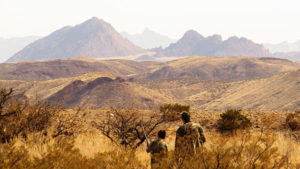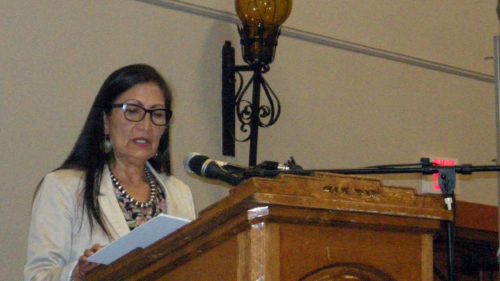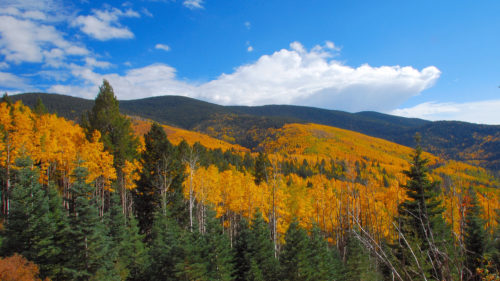On January 20, 2017, Donald J. Trump will be sworn in as the 45th president of the United States. The New Mexico Wildlife Federation is grateful for the peaceful transition of power, and to all who have fought for our ability to vote for our leaders. We are committed to work within our democratic system to support or challenge actions and policies affecting our public lands and wildlife.
As New Mexico’s oldest and largest sportsman’s organization, NMWF has a duty to evaluate the election outcome’s significance to the wondrous Western lands, wildlife, and outdoors heritage we all cherish. Looking solely at publicly stated policy, without regard to party, in this statement we focus on the incoming administration’s and Congressional leadership’s positions on conservation issues such as national public lands retention and management, wildlife enhancements, and habitat and watershed protection.
With the laudable exception of President-elect Trump’s stated opposition to the Republican party platform calling for massive transfers of national public lands and resources to the states, many of those positions pose grave challenges to conservation if carried out. As proposed, they reveal an agenda in direct conflict with the desires of a bipartisan Western constituency who clearly want our nation’s public lands to remain public, to be protected, and to be prudently managed now and for generations to come.
That same constituency of Western hunters, anglers, recreationists, wildlife advocates, and conservationists stretch across party lines and the political spectrum. They – you, we, all of us – must now rise to the challenge of setting aside lesser disagreements and unite to preserve our shared core values, values that center around our public lands heritage, healthy wildlife populations, healthy habitats, and healthy watersheds.
That doesn’t mean shutting out resource development and uses. Those same voters – and NMWF – also recognize that public lands resource development and extraction are vital components to our national and state economy. At the same time, those voters send a solid message that temperance, immense care, and self restraint must be applied to the national resource development process.

At one time in our nation’s history, conservation was a bipartisan ambition, and among Western voters of all political stripes, it still is. Republican, Democrat, and independent, a majority of voters in the Rocky Mountain-area states where public land ownership and management are most hotly contested have opinions in stark contrast to many of the positions the incoming leadership espouses.
Those states are New Mexico, Arizona, Utah, Colorado, Wyoming, Montana, and Idaho. Many of those voters – in most of those states the majority – are Republicans. They have for generations sustained the conservation principles their party once championed but whose current leaders seem to have forsaken:
- Republican president Theodore Roosevelt almost single-handedly gave us our vast public lands estate as a reaction to large-scale destruction of our natural resources.
- Republican president Richard Nixon gave us the Environmental Protection, Clean Air, Clean Water and Endangered Species Acts.
- Republican President Ronald Reagan issued a clarion call to all Americans to preserve our public lands and natural resources, saying, “We want to protect and conserve the land on which we live – our countryside, our rivers and mountains, our plains and meadows and forests. This is our patrimony. This is what we leave to our children. And our great moral responsibility is to leave it to them either as we found it or better than we found it.”
Today’s GOP platform on conservation and the environment is a sad departure from those core ideals. It will take immense and collaborative pressure from unified bipartisan groups, including sportsmen and conservationists of all stripes, to turn the party back to its proud heritage.
Public Lands and Public Lands Transfer
New Mexicans are equal shareholders with all other Americans in 647 million acres of public land across the United States. You, your children, and your children’s children have vast and spectacular public lands to hunt, fish, and recreate on across the country, a uniquely American idea.
Unfortunately, the GOP’s official platform favors massive disposals of our national public lands and resources, an incredibly misguided position. Thankfully, President-elect Trump has bucked that position and vocally supported keeping public lands in public hands. His view aligns with the Western voters’, his party’s does not: 58 percent of all voters in the seven states surveyed, and 63 percent in New Mexico, oppose public land transfer.
We all as voters must fully support Trump’s pledge to protect our public lands, even in the face of opposition from powerful interests in his own party. If he yields, we could see the abrupt end of our legacy approved with his signature, and some sort of Congressional move to that effect is almost certain to come.
President-elect Trump built his career as a businessman. At the end of the day public land, water, minerals, grass for stock, timber, and even wildlife are all extremely valuable commodities. Making sure that our public lands and their resources don’t end up as a bargaining chip will take a massive, coordinated upswell of pressure from sportsmen and women across the nation.
Despite his stated support for keeping public lands in public hands, Trump has made some other comments that should concern sportsmen. For example: Talk show host Sean Hannity asked president-elect Trump which “wasteful” government agencies he’d eliminate as president. “The Department of the Environment,” Trump responded “I mean, the DEP is killing us environmentally, it’s just killing our businesses,” he said, referring to the Environmental Protection Agency (EPA). Far from being wasteful or hurting the economy, the EPA has protected the environment and our health for decades. Dismantling the EPA would have disastrous consequences.
Ironically, it was Republican President Richard Nixon who created the EPA via an executive order, ratified by a bipartisan Congress, as an urgent necessity to address myriad catastrophic environmental crises of the time. Rivers were so polluted that they actually caught on fire. Many watersheds and wetlands critical to the survival of waterfowl and game fish were too poisonous to support and sustain life. Air pollution caused myriad illnesses throughout the country. Species such as the American Bald Eagle were on the brink of extinction due to the toxic fish they were consuming.
From this environmental crisis came pragmatic laws and regulations not only to correct existing problems, but also to ensure that our national water and air quality remained safe and were able to sustain healthy populations of fish and wildlife into the present and continuing into the future. Voters, if not politicians, foresee the harm of dismantling the agency and removing common-sense protections, rating water pollution and wildlife habitat degradation as serious problems.
Maybe that’s because we’ve seen pollution’s effects first-hand in New Mexico and throughout the Southwest. New Mexico anglers may recall the Pecos River fish kill caused by runoff from the Terrero Mine’s waste piles. EPA intervention saved the state – and particularly the State Game Commission – from bearing the full brunt of millions of dollars in cleanup costs. The same is true for remediation of the Red River, contaminated with waste from the Molycorp Mine, and is being repeated along the Animas and San Juan rivers and the Gold King mine spill. More importantly, the EPA and the Clean Water Act work to prevent pollution before it happens. Our waters, land, and air still desperately need those protections.
Another stated goal of the President-elect and the Congressional leadership is to rapidly expand oil, gas, and mineral production on public lands by increasing the acreage available for leasing, speeding the application process, and relaxing regulations that help protect wildlife habitat, watersheds, and cultural resources. If implemented as currently outlined, those policies could lead to landscape-scale degradation of critical habitat for elk, deer, turkey, waterfowl, upland birds, bear, antelope, fish, and a multitude of other wildlife. Here again, politicians and their constituents diverge. A majority of Western voters do not support any increases in drilling and mining. They do support continuing at the current rate – but with increased safeguards, rather than fewer.
Damage from rash exploitation and degradation could occur on a scale never seen in modern American history with the elimination of the EPA:
- The Department of the Interior manages one-fifth of the national public land in the country. That’s all of our Bureau of Land Management (BLM) land, National Parks, Preserves Monuments, coastlines, and offshore waters. The Bureau of Indian Affairs, also part of Interior, is entrusted to honor our agreements with 568 Indian Tribes. All the agencies within the department are charged with conserving fish, wildlife, and their habitats, as well as our national public lands and minerals, national parks, and wildlife refuges.
Dismantling a major federal agency would require major legislation, but easier paths to reckless actions are readily available through cabinet and agency appointments, resetting priorities administratively, and slashing appropriations. Unfortunately, based on past actions of the GOP-led Congress and current budget documents, we can particularly expect the latter – unprecedented cuts in agency budgets and specific land and wildlife conservation funding, with dire consequences to our landscapes, watersheds, fish, and wildlife.
The annual budgets of virtually every national public lands and wildlife management agency, including the National Park Service (NPS), BLM, and US Fish and Wildlife Service, have already been drastically cut in the past decades. As it stands now, the budget proposed by House Speaker Paul Ryan cuts the Interior Department budget by another $7.3 billion in 2017. The US Forest Service, its already shrunken budgets additionally shattered by wildfire costs, faces similar shortfalls.
The gaps between the political leadership of the moment and Western voters’ long-standing support for public lands, waters, and wildlife are deep. The challenges are many. The purpose of our statement is not to overwhelm, but to stress that time is of the essence. We as individual sportsmen and women and the greater outdoor recreation community must come together as never before to pressure our elected officials across the nation – and especially soon-to-be President Donald Trump, his appointees, and Republican congressional delegates – to temper their drive to undermine the conservation foundation of this nation.
Hesitancy to act and demand support from our elected officials will result in truly regrettable consequences.
Our outdoor heritage is on the line. Together we’re unstoppable. Join us as we fight for our environment as we never have before.



